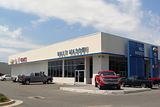
To protect your automotive investment, and to get the maximum reliability and safety from the vehicle you depend upon daily, you need to establish and follow a maintenance plan. The best place to start a maintenance program is by reading your owner's manual. In it you will find the manufacturer's recommended maintenance schedule. This is based on "normal" driving, but very few of us drive "normally." The roads are typically dusty and strewn with potholes and speed bumps. The manufacturer's recommended maintenance schedule is the starting point for your vehicle maintenance plan, not the end of it. Here are some general recommendations, which apply to all types of cars and trucks.
Lube It For Life
The engine is the heart of your vehicle and probably the most costly to repair when something goes wrong. Modern electronic controls have eliminated a lot of adjustments, and what we used to call a tune-up has evolved into something akin to a complete physical, where most of the work involved is designed to verify proper operation of computer control systems. While it's true that new cars and trucks run cleaner than ever before, the engine and all its related control systems must be kept operating exactly as designed to prevent increased engine emissions and a host of driveability problems. The one thing you can do that will add many miles to your engine is regular oil and filter changes. Most auto manufacturers recommend oil and filter changes every 7,500 miles or six months, under "normal" conditions, but many believe a better interval is 3,000 miles or three months. By changing the oil regularly, the inside of your engine will stay clean and you'll avoid damaging sludge build up.
Keeping Your Cool
Today's cars also run hotter than they used to. With the trend to downsize vehicle components to save space and weight, cooling system components are being asked to do more than their older counterparts. The best thing you can do to maintain the cooling system at peak efficiency during the life of your car is to replace the coolant according to the manufacturer's recommendations. Although some of the newer coolants last longer, anti-freeze does wear out. By replacing the coolant periodically, you insure that the corrosion inhibitors are fresh and are helping to eliminate the scale and corrosion that builds up inside the cooling system.
Fluid Facts
Probably the most ignored fluid in the car, and the most important, is the brake fluid. Brake fluid is not a petroleum-based product, so it does absorb moisture from the air, which diminishes its effectiveness and lowers braking performance. Sludge will also build up over a period of time and may block the valves inside anti-lock brake (ABS) units and result in costly repairs or replacement. In addition, this sludge may cause calipers and wheel cylinders to leak, also resulting in repairs or replacement. So the best thing to do is to have the brake fluid flushed and refilled periodically, although manufacturer recommendations vary as to how often. A good rule of thumb is to have the brake fluid changed and the system flushed every 36 months or 75,000 miles. The transmission fluid also needs to be changed on a regular basis to help keep the transmission in tip-top shape. Here again, some manufacturers have increased maintenance intervals to 100,000 miles for transmission fluid changes, but they still need periodic maintenance. Most transmission failures can be directly traced to lack of maintenance. When planning your maintenance schedule, consider that even one transmission replacement will probably greatly exceed the cost of all the fluid and filter changes for the entire life of the car. Power steering is another fluid that is often ignored. It is recommended that it be flushed and refilled at least as often as you replace the brake fluid.
Replacing the differential fluid is something that is most often overlooked. A regular fluid change will help the differential last the life of the vehicle. If your vehicle is four- or all-wheeldrive, change the transfer case fluid as well.
Get Out The Grit
Filters are an important part of regular maintenance. Air and fuel filters keep dirt and abrasive grit out of the engine. Problems arise when these filters get dirty and start to clog up. Many driveability problems, such as hesitation and rough idle, can stem from dirty air and fuel filters. For maximum effectiveness, they should be replaced about every 15,000 miles, but driving in dusty conditions can require more frequent air filter changes. A filter that is very rarely replaced, but should be, is the carbon canister filter. It is an important part of the emission control system and filters the incoming air that this system uses. The canister is such an integral part of today's engine management system that a clogged canister filter can also result in driveability or emissions problems.
Some cars still have a positive crankcase ventilation (PCV) filter, also called a breather element. This filters the air for the PCV system to ensure clean air enters the engine crankcase. Most cars today draw air for the PCV system from the air cleaner housing so this filter is not needed, but if your engine has one, replace it at 15,000 mile intervals as well. Speaking of the PCV system, the PCV valve (if equipped) should be replaced on a regular basis, too. When you put the new PCV filter in, replace the PCV valve as well. Many cars now use a metered orifice instead of a PCV valve and this should be checked periodically for free flow.
Today's Tune-Up
Ignition systems have become much more reliable over the years. Many engines don't even have distributors anymore. They use a DIS or Direct Ignition System. These systems can either mount one ignition coil on each spark plug, or share one coil for two plugs, thus eliminating the need of a distributor. On engines that still use a distributor, it is a good idea to replace the distributor cap, distributor rotor and ignition wires according to the manufacturer's recommendations. The spark plugs need to be replaced on a regular basis as well. Even though some manufacturers have extended those intervals to 100,000 miles, this doesn't apply to all engines. The best plug to use is the one the manufacturer recommends. This information can usually be found on an engine decal located under the hood.
Belt Basics
Perhaps the most critical engine component these days is the timing belt. Not all engines use a timing belt, but on those that do, it's critical that it be replaced before it breaks. At some point the belt breaks and, if your car has an interference engine where the valves and pistons occupy the same place in the combustion chamber at different times, serious engine damage can occur. If your car has a non-interference engine, the worst that will happen is you get stranded somewhere. Most manufacturers suggest replacing the timing belt every 60,000 miles. Other engine drive belts should be checked on a regular basis (about as often as you change oil). In general, you should be on the lookout for excessively cracked, glazed or frayed belts. Many accessories including the alternator, power steering pump and coolant pump are operated by drive belts. If these belts break or slip, the components they drive will fail to work, and that can leave you stranded. One more thing to check while you're looking at the belts is the battery. Virtually all batteries are maintenance-free these days, except for a periodic terminal cleaning and inspection for cracks or leaks. Also, make sure the battery is mounted securely.
Tire Tips
Tires are one of the most important maintenance items under your car. The best way to get the most out of your tires is by having them rotated and balanced on a regular basis, about every 7,500 miles. This will ensure that they wear evenly and last as long as possible. Balancing is important to eliminate vibration at road speeds and because a properly balanced tire reduces the stress and strain on shocks, struts, and steering parts. Keeping the tire pressures set to specification will also go a long way in extending tire life and fuel economy.
Last Word
Finally, you should get in the habit of replacing your wiper blades once a year. Wiper refills are the most inexpensive safety feature on your vehicle. And if you doubt having good wipers is a safety feature, try driving with bad ones in a downpour at night. If you live in an area that suffers cold and snowy winters, you may want to change to winter blades in the fall and go back to regular blades in the spring. Following a maintenance program is the best insurance you have against unexpected breakdowns. It can also pay dividends by allowing you to get the most out of your transportation investment. With a little forethought and TLC, that family chariot can reliably deliver a couple of hundred thousand miles of service.
Customers and Car Care
Survey Says...
Unlucky Seven
Services Most Neglected by Customers
| Oil, Filter, Lube | 35% |
| Transmission | 19% |
| Tires | 14% |
| Cooling System | 13% |
| Brakes | 10% |
| Belts | 5% |
| Tune-Up | 4% |
For more information on how you can protect your new vehicle: www.WaltMassey.com
courtesy www.ase.com





